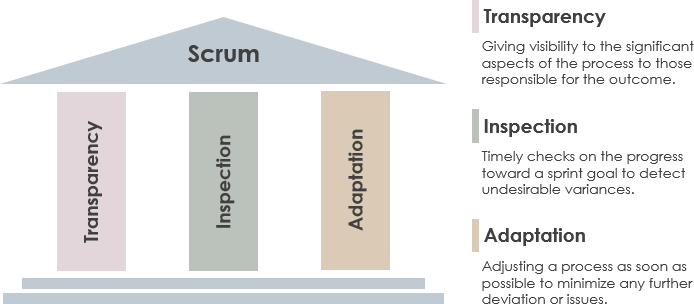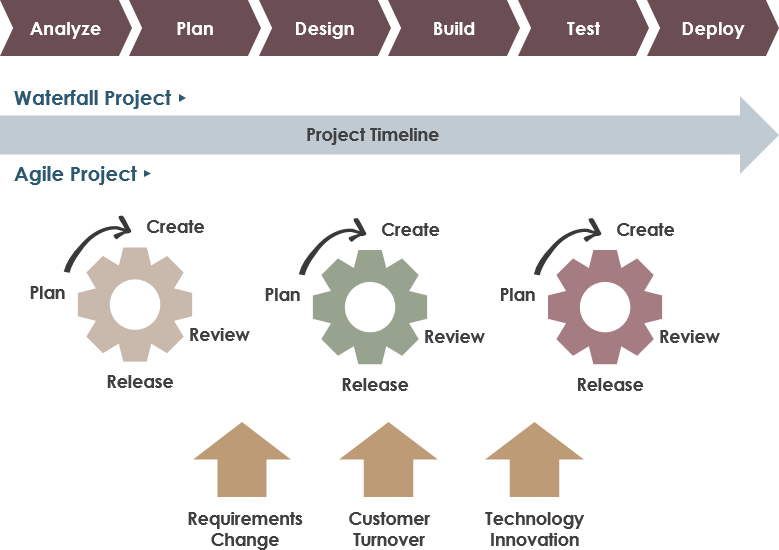Empirical process control is a core Scrum principle and distinguishes it from other agile frameworks. The Scrum Guide puts it well:
“Scrum is not a process or a technique for building products; rather, it is a framework within which you can employ various processes and techniques. Scrum makes clear the relative efficacy of your product management and development practices so that you can improve.”
Both SCRUM and LeSS Framework adopt an empirical approach (or sometimes called empiricism) to adapt to the changing requirements of the customer. Empiricism is the act of making decisions based on what is experienced. The empirical approach means working in a fact-based, experience-based, and evidence-based manner, and in particular, progress is based on observations of reality, not fictitious plans based on a large number of upfront requirements.
With empirical process control, we don’t fix the scope of the product nor the processes of how to build it. Instead in short cycles, we create a small shippable slice of the product, inspect what and how we create it and adapt the product and the way we build it, with built-in mechanisms for transparency to enable clear inspection.
In short, we can learn and improve upon past mistakes and experiences. The three pillars of Scrum that uphold every implementation of empirical process control are Transparency, Inspection, and Adaptation as shown in the Figure below:

Transparency in Scrum can be realized by scrum tools such as Product Backlog, Task Boards and Burndown charts, Daily Stand-ups, Retrospectives, Definition of Done, Sprint Reviews, etc. These are used to transfer the flow of work through a cross-functional team. This is one of the key advantages in SCRUM – allowing visibility with regards to the progress of work and team. This means when the team is achieving its goal, those responsible for it can be recognized and appreciated for the efforts.
Scrum artifacts must be frequently inspected and progress towards a goal to detect undesirable variances. Inspection in Scrum can be realized by scrum activities such as:
In an Agile world, we always embrace and Adapt changes, so that we can constantly improve. Adaptation means that we change what does not work or what could work better. It means that we constantly run small experiments, keep what is working and change when we fail. We use the results from our inspections to decide which experiment to run next, for example:
Why is Scrum based on empirical process control? Because central to the insight of Scrum is that product development is too complex a domain—and with too much variation between product groups—for an elaborate set of “canned” defined process control formulas.
As shown in the Figure below, an empirical process control expects the unexpected, while defined process control expects every piece of work to be completely understood in the upfront.

In empirical process control, you expect the unexpected. With defined process control, every piece of work is understood. In Scrum, an empirical process is implemented where progress is based on observation and experimentation instead of detailed, upfront planning and defined processes. As mentioned above, using empirical process control is working in a fact-based, experience-based, and evidence-based manner that control is exercised through inspection, adaptation. The Empirical Process Control has the following characteristics:

| About Visual Paradigm |
 Visual Paradigm helps organizations stay competitive and responsive to change faster and better in today’s fast-changing environment. Our award-winning products are trusted by over 320,000 users in companies ranging from small businesses, consultants, to blue-chip organizations, universities, and government units across the globe. It enables organizations to improve business and IT agility and foster innovation through popular open standards and process frameworks. Visual Paradigm, a killer Agile feature in 2018, introduced Scrum Process Canvas for automating the way a Scrum team to create, manage and deploy software application that empowers the team to continuously improve their performance at unprecedented speed and scale. Visual Paradigm helps organizations stay competitive and responsive to change faster and better in today’s fast-changing environment. Our award-winning products are trusted by over 320,000 users in companies ranging from small businesses, consultants, to blue-chip organizations, universities, and government units across the globe. It enables organizations to improve business and IT agility and foster innovation through popular open standards and process frameworks. Visual Paradigm, a killer Agile feature in 2018, introduced Scrum Process Canvas for automating the way a Scrum team to create, manage and deploy software application that empowers the team to continuously improve their performance at unprecedented speed and scale.
Manage the Entire Scrum Process in One Page
|